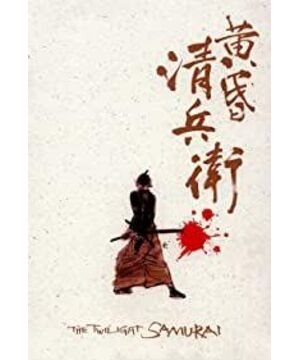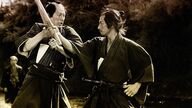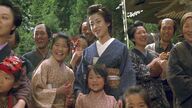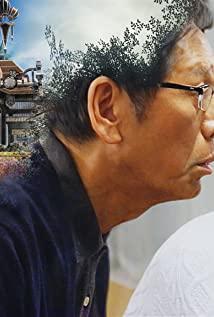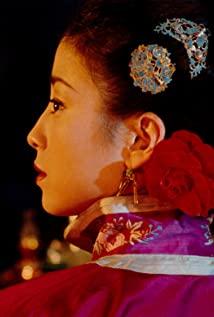Fujisawa Shuhei (1927-1997) was a Japanese martial arts novelist who was as famous as Sima Ryotaro and Ikeba Shotaro. . In his works, there are no soul-stirring historical epics, no ups and downs storylines, and no martial arts stunts of flying immortals. There are only low-level warriors who are restrained, restrained, conservative, and forbearance adhering to the true meaning of Bushido. Yamada Yoji, who enjoys the reputation of "common director", was attracted to this kind of samurai image by Fujisawa Shuhei. Through the film, he depicts the ordinary life and inner world of these ordinary little people delicately and tenderly, as well as their blooming in the ordinary. life value.
Seibei Iguchi in "The Seibei of Dusk", Sozo Katagiri in "The Hidden Sword and Ghost Claw", and Shinnosuke Mimura in "One Point of the Samurai", these three are all small remote clans in Japan's shogunate era. the bottom warrior. They are not aristocrats, they are only low-level employees of the vassal lords of the separatist side, living at the bottom of the aristocratic pyramid, and they have no privileges in the power system. They do not have titles or fiefs, but only a surname that represents the identity of a samurai and a residence bestowed by the feudal lord. If they accidentally offend the feudal lord or make a mistake, they will lose even this point, be expelled from the feudal lord, and become a refugee. They received an annual salary of three to fifty shi from the feudal lord, and they could only make ends meet. They could not compare with those middle-level and high-ranking samurai who had an annual salary of 200 shi and were arrogant and extravagant all day long. However, it is such a humble position and a poor position, but they have to use their wealth and life as a mortgage.
They lived in a special historical period - the middle of the nineteenth century, on the eve of the Meiji Restoration. At that time, Japan's shogunate government system and the ruling structure of feudal rule were crumbling, and great social changes were already on the horizon. The samurai class began to divide, and the middle and high-level samurai became increasingly rotten. In order to safeguard their vested interests, they tried their best to contain changes. They had already abandoned the essence of Bushido spirit and replaced them with power and profit; low-level samurai did not have prominent political status and rich family assets to protect themselves. , or join the reform camp to fight against the old forces, or wait and bear silently in the ruthless changes of the times. Iguchi Kiyobei, Katagiri Zongzang and Mimura Shinnoki, they belong to the latter of the latter.
They are poor and happy. Although Iguchi Kiyobei owed debts due to his wife's treatment and burial, he not only farmed in the courtyard, worked odd jobs for merchants, but even sold the samurai sword, which symbolizes the soul of a samurai, and made himself disheveled and disheveled. But he sees taking care of his family as a responsibility and a pleasure, and he can still share laughter with his mother and daughter in the midst of hardships. Katagiri Zongzang was alone, and belonged to the type of one person who was full and the whole family was not hungry. Shinzhicheng Mimura has a virtuous wife, who manages the house well, and does not lose the warmth of life in rough meals.
Their careers are hopeless. In addition to doing a good job of "Ozou" (warehouse manager) all day, Iguchi Kiyobei went home to take care of his mother and two daughters. He had no time to drink and have fun with his colleagues, and gradually became a marginal person. Although Katagiri Sozo has a unique skill, he is implicated by his father's alleged corruption and suicide by Caesarean section and has no chance of developing. Shinnoki Mimura's duty is to be "poisoned". Every day, he has to taste the food before the feudal lord eats to check whether the food is poisonous. If he can save his life by doing this job, he will be lucky.
They've all gone through a life-or-death decision with different endings.
Under the strong orders of the clan elders, Iguchi Kiyobei risked his life to duel with the first swordsman in the clan, and was lucky enough to win. But in the end, he was still a samurai of the feudal lord and died in the Boshin War of the shogunate against the Meiji Emperor.
Because of his friend's involvement in the conspiracy, Katagiri Sozo was forced to take orders to hunt down his friend to prove his innocence, but after his friend was stabbed by him, he died under a Western musket. In order to avenge his best friend and his wife, he assassinated the clan elder, then gave up his status as a samurai, and took his beloved woman to seclusion on the island.
Shinnosuke Mimura lost his eyesight due to drug testing, and nearly lost his status and salary as a samurai. In order to take shame on his humiliated wife, he challenged a senior samurai in the domain. After putting his life and death aside, he finally killed him and started life with his wife again.
Their stories are filled with the trivialities of daily life, and their techniques are realistic and plain as water. Even the three duels are unpretentious and almost banal. However, the connotation of Japanese Bushido spirit runs through it faintly, as if in the darkness before dawn, the dawn is first on the horizon in the distance, and then gradually spreads and spreads out, illuminating the world unconsciously, subtly letting you experience The shock and beauty in between are unforgettable.
At the end of "The Qingbei of Dusk", the daughter of Iguchi, who is already an old woman, stands in front of her father's tomb and tells lightly: "... During the Meiji era, most of my father's old colleagues were on the rise, and I often heard them say , Twilight Kiyobei is really an unfortunate man. But I don't think so. My father loves us deeply, and he is loved by the beautiful Miss Pengjiang. The short life is full of beautiful memories. And I also feel for such a father. Proud..." Iguchi Kiyobei did so, as did Katagiri Zongzang and Mimura Shinnoki.
These three warriors, who were mediocre before, like a drop in the ocean and a sand in the end of the world, then disappeared in the smoke of war, or hid in remote islands, or remained silent in their huts. In the torrent of history, they quietly faded with the twilight of the warrior era. However, only the outside is gone. The true warrior spirit is immortal. Now, like the bright shadow of a sword drawn by a samurai sword, the moment is also eternal...
(February 4, 2010, Shenzhen)
View more about The Twilight Samurai reviews


